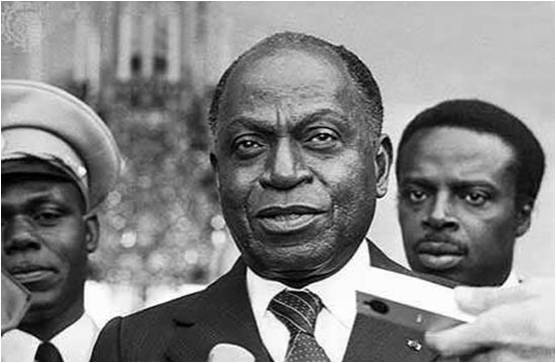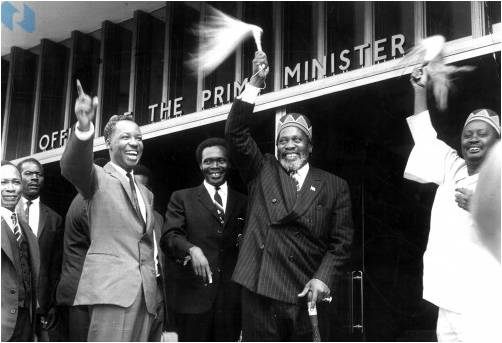Colonial policies and independence policies
The former colonial powers have been generally blamed for the 'balkanization of Africa, that is, the dividing up of the continent into a large number of states, most of them small and economically unviable. The partition of Africa has been compared with the creation of a number of weak states in south-east Europe (the Balkans) in the late nineteenth, and early twentieth centuries out of the European colonial possessions of the Ottoman Empire (Turkey). The colonial powers in Africa, it has been held, contributed to disunity in Africa: first by creating 50 or so separate colonies, many of them smaller than some pre- colonial African States; secondly by ruling the colonies on the basis of divide and rule, and by encouraging ethnic rivalries within African states during the decolonization process.

Study the map of Africa above and name the Countries including the colonial masters. Remember Southern Sudan is not indicated.
How justifiable is it to levy this charge of fostering disunity against the colonialists? An answer can be found only after studying the policies of different colonial powers in different regions.
West Africa
In West and Equatorial Africa it is undoubtedly true that France can, to a large extent, justly be held responsible for balkanization. French governments from 1956, when the Loi Cadre was passed and popularly elected territorial assemblies were set up, followed a policy of balkanization in order to create weak states that would individually be dependent on France instead of being united in strong federations able to challenge the domination of Paris in African affairs. Thus balkanization was the essential prerequisite of neo-colonialism in post-independent French-speaking Africa.
Britain
Britain, on the other hand, had a better record than France on this issue, even if some of the British federal schemes were laid on shaky foundations. The Central African Federation (1955-63) was an attempt to overcome the balkanization of British Central Africa into Southern Rhodesia, Northern Rhodesia and Nyasaland. The East African High Commission was a major step forward towards economic unity in Kenya, Uganda and Tanganyika. Similarly, common services were set up for the four British West African colonies. Moreover, Britain's decolonization policies involved the unification of British Somaliland with Italian Somaliland and British Cameroons with French Cameroun.
It is easy enough to dismiss the Central African Federation as a misguided attempt at unity between white settlers and African nationalists. The federation broke up because of the growing force of African nationalism. The British government sensibly gave way to the African territorial nationalists in Zambia and Malawi who demanded separate independence and secession from a federation ruled by the white settlers.
The Africans feared settler domination and they associated federation with racist white-minority control. Britain disbanded the federation it had created.
One could argue that the Zambians and Malawians might well have accepted federation if Britain had pushed the rate of African advance in Southern Rhodesia (Zimbabwe) between 1955 and 1962, at the end of which period it became clear the federation could not survive. On the other hand it would be unrealistic to exonerate African nationalist leaders both in Central Africa and indeed throughout the continent of a large measure of blame for the perpetuation of the balkanization of Africa at the time of restored independence.
In French West Africa, the Ivory Coast leader Houphouet-Boigny, fearing the sharing of Ivory Coast's wealth with poorer states, was as responsible as was De Gaulle or any other French political leader for the abortion of the proposed West African federation.
 Felix Houphouët-Boigny , First president of Cote d`Ivoire and one
of the most peaceful African leaders
Felix Houphouët-Boigny , First president of Cote d`Ivoire and one
of the most peaceful African leaders
In British West Africa it was the African leaders of the new states, not the British, who broke up the common services such as the British West African Currency Board, the West African Airways Corporation, the West African Cocoa Research Institute and the West African Court of Appeal.
In British East Africa, it is true, the new African rulers at first developed the High Commission in the laic 1960s, but the East African Community collapsed in the late 1970s. In East as in West Africa rival African territorial nationalisms have proved as powerful a factor as colonial policies in maintaining the balkanization of Africa.

Congress RDA in Bamako in 1957. From left to right: Sékou Touré, Félix Houphouët-Boigny and Doudou Gueye.
Leaders like Nkrumah and Sekou Toure with their Ghana-Guinea Union, and Nyerere with his proposal to delay Tanganyika's independence to coincide with Joint independence for Uganda and Kenya, so that an East African Federation could be created, have been the exception rather than the rule. So far the only successful attempts to overcome political balkanization in post- independence Africa have been the unification of Cameroon and the union of Tanganyika and Zanzibar into Tanzania.

East African leaders in 1960s: JK Nyerere, AM Obote, Jomo Kenyatta and Jaramogi Oginga. Nyerere proposed to delay Tanganyika's independence to coincide with Joint independence for Uganda and Kenya, so that an East African Federation could be created.
The time is long past when African political leaders can meaningfully blame the political balkanization of Africa on the departed colonial rulers. Africa's new nation-states are as much the spheres of influence of new territorial nationalist elites as they once were spheres of the colonialists.
National Movements and New States in Africa